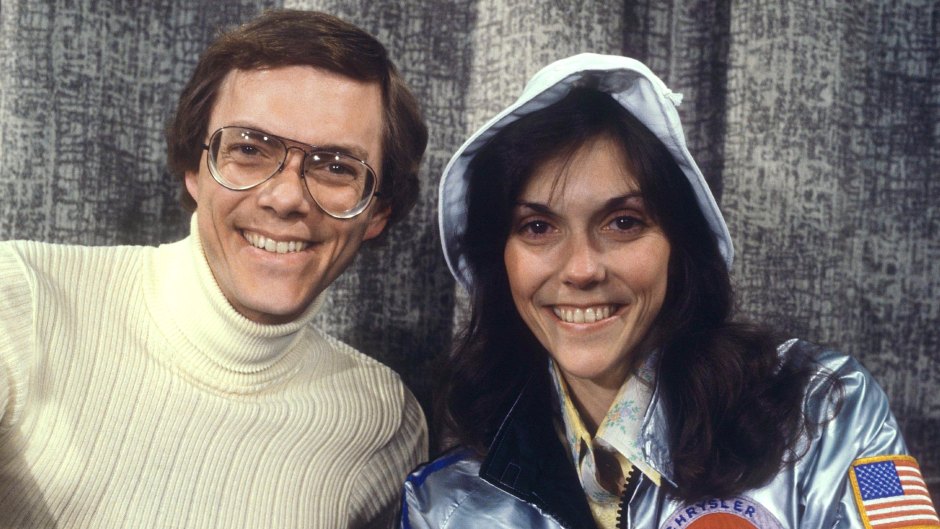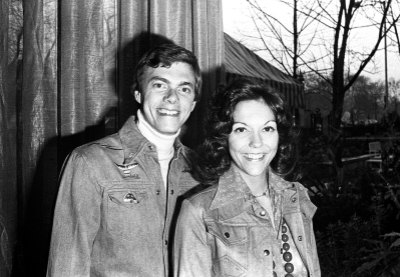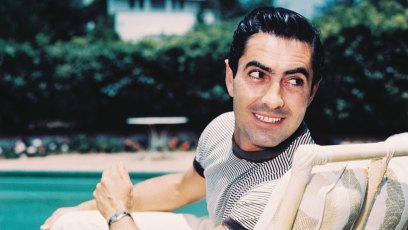
Shutterstock
Musician Richard Carpenter Says Late Sister Karen Was ‘Silenced Way Too Soon’
Beginning with their seminal smash “(They Long to Be) Close to You” in 1970, the Carpenters produced a string of AM radio hits that would become the soundtrack of a generation. Songs like “We’ve Only Just Begun,” “For All We Know” and “Top of the World” were played at weddings, graduations and other happy celebrations, making the Carpenters’ songbook a beloved part of fans’ personal histories.
“We were an overnight sensation,” Richard, 75, the duo’s arranger and creative force, admits to Closer. “We were headlining in Las Vegas within a little more than a year from when we hit. Everything was very fast.”

Of course, it ended too fast, too. Karen, the act’s honey-voiced singer died of a heart attack brought on by her struggle with anorexia in 1983. Today, a new book, Carpenters: The Musical Legacy by Mike Cidoni Lennox and Chris May with Richard Carpenter is helping to keep the duo’s memory alive. The tome dives into their meteoric rise and the genesis of their songs and shares never-before-seen photographs and memorabilia from Richard’s own collection.
“It’s not a strict biography,” explains the musician, who has authorized only one previous book about the duo. “It’s more about the music, so that appealed to me.”
What are your earliest memories of playing music with Karen?
“I was 16 and Karen was 13. I was a budding songwriter, so I asked Karen to sing a couple of these songs that I’d come up with. At that time, she didn’t have the marvelous voice that developed later. She had a higher sound, but she sang in tune. So every now and again, I would ask her to sing some new song that I’d written. She’d do it begrudgingly because she didn’t care to be singing at all.”
When did she start getting excited about music?
“A drummer for a group that I had in New Haven, Connecticut brought his set over to our house and set it up in our basement. It was a gold sparkle Ludwig set. And it just caught Karen’s eye.”
Is it true that you both joined your high school marching band to get out of gym class?
“Karen got out of phys ed [by joining the band]. She had accordion lessons, briefly, and flute lessons, briefly, so she knew how to read music. I recommended glockenspiel since it marches with the drums.”
You signed with A&M Records when you were still teenagers. Did you always have faith that the Carpenters would succeed?
“Oh, yes. I believed in Karen as a singer, myself as an arranger and the two of us as a sound. I knew that we had a hit sound, I knew it. We did have that first single, which got on the charts [1969’s “Ticket to Ride”]. It didn’t become a hit, but it also didn’t stiff.”
But you still almost got dropped from your label?
“Pretty much the whole of the label thought that Herb Alpert had had his experiment with us and would let us go. He said, ‘No, I want to give them one more chance.’ And that was one of the greatest decisions he ever made. Everything that followed came from that.”
Did you know that “Close to You” would be huge?
“I had an intuition, a gut feeling. I felt there would be no in-between — either it was going to be one of the great stiffs or a smash.”
What is your proudest accomplishment with the Carpenters?
“I’m very proud of that arrangement of ‘Close to You,’ because I had nothing to influence me. I hadn’t heard Dionne Warwick’s version yet. But it was one of the few times that Burt Bacharach actually didn’t have the right arrangement for one of his songs. So I would have to say my proudest accomplishment is ‘Close to You.’ The arrangement and the record are really something.”

Do you have other favorite Carpenters songs?
‘One would be ‘Superstar.’ And another is ‘Yesterday, Once More.’ I like that one a great deal.
In the new book, you say that one of your few career regrets is the Carpenters’ 1978 album, Christmas Portrait. Why do you regret it?
“I was having — I can’t call them health problems — but I had gotten hooked on prescription sleeping pills. I did very little, as far as arrangement, on that album. So to me, it’s not a true Carpenters Christmas album. It’s a Karen Christmas album. It’s a beautifully done album, but all I did was produce it. I did a couple of arrangements, but nothing like I would have if I had been my normal self. “
Was it hard to return to making music after Karen’s death?
“After Karen passed away, I was in shock. I had gone to a rehab, and I had gotten off the sleeping pills. I was healthy and full of life and full of a desire to keep making records. So I polished up and finished as many [Carpenters] outtakes as I could. They’re nothing to be ashamed of, those albums, they’re all very well done. Of course, Karen sounds beautiful. But you know, they’re outtakes.”
What do you miss most about Karen?
“The most? She was my buddy. And she was silenced way too soon. I mean, a voice like hers comes along once every three generations — maybe. I just think of all of the beautiful recordings we could have made.”
Do you think she would still be making recordings today if she had lived?
“She’d be like 71 right now, and I’m certain she would be absolutely fabulous. Perry Como sounded great at 75 because he sang properly. Karen was the same. We would have had hundreds of recordings of the two of us already done, and we’d still be making more.”
What is your life like now?
“It’s nice. I have a lovely wife of 38 years and five grown up kids. We live in a beautiful community in California. I’m healthy, touch wood — that’s the first and foremost thing.”
Do you have any hobbies?
“I have my auto collection, which is my love other than music.”
You also have a new album of reinterpreted Carpenters songs: Richard Carpenter’s Piano Songbook.
“Yes, it’s out on Decca Records. There’s so much interest in the Carpenters that there is always something else going on. I’m still full of life and music and making records.”
— Reporting by Amanda Champagne-Meadows








































